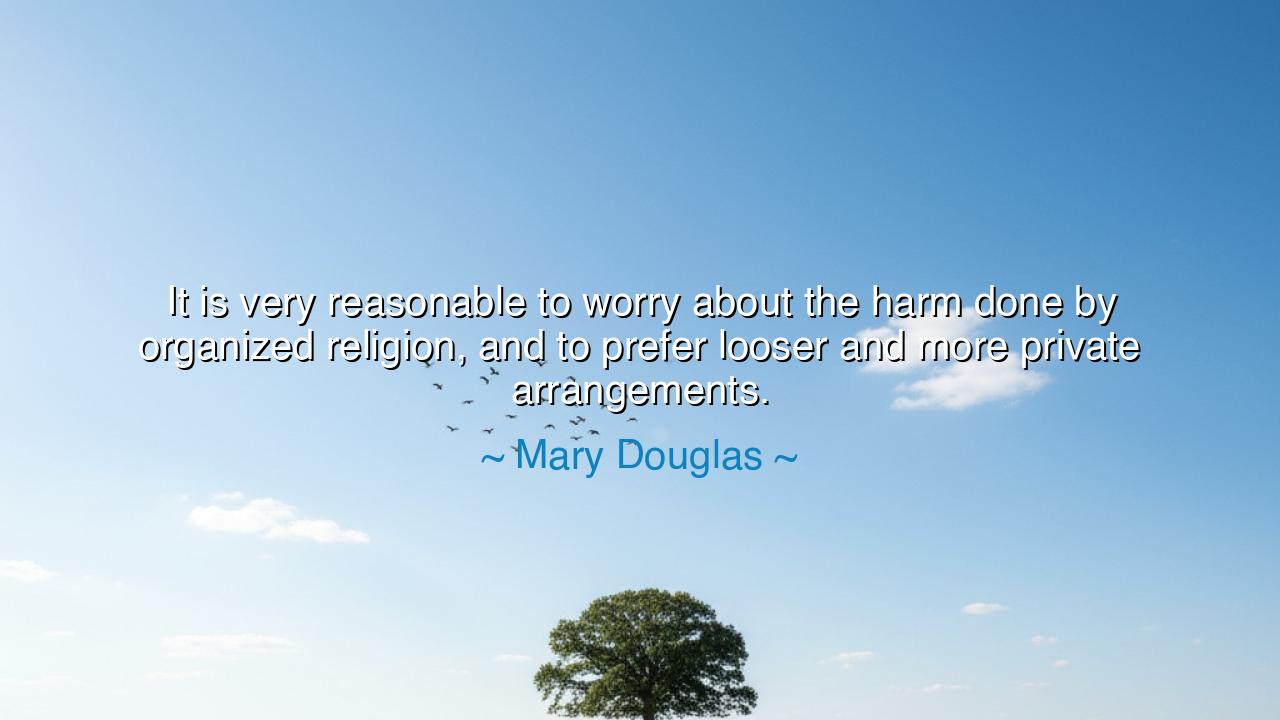
It is very reasonable to worry about the harm done by organized
It is very reasonable to worry about the harm done by organized religion, and to prefer looser and more private arrangements.






In the long and storied history of mankind, religion has been a powerful force, shaping not only the hearts of individuals but the course of entire civilizations. Yet, as the wise Mary Douglas teaches us, there is also reason to be wary of the harm done by organized religion. For while religion holds the potential to guide, to inspire, and to bring communities together, it also has the capacity to divide, to enforce dogma, and to perpetrate harm. Organized religion, when it becomes rigid and institutionalized, can impose structures that suffocate the very freedom of thought and spirit that religion was meant to nurture.
Let us recall the story of Galileo Galilei, the great astronomer whose observations and discoveries challenged the long-held beliefs of the Catholic Church. Galileo, a man of deep faith, believed that the truth of the cosmos should not be confined to religious dogma but should be discovered through the pursuit of knowledge. Yet, the Church, in its organized form, condemned his teachings as heretical, resulting in his trial and house arrest. This story is a reminder of the dangers inherent in organized religion when it grows too powerful and inflexible, stifling the pursuit of truth and individual thought. Galileo’s story echoes through time, serving as a testament to the need for freedom of belief and thought, unbound by the chains of rigid religious structures.
There is a certain beauty in the freedom of personal spirituality, where an individual can seek their own connection with the divine without the constraints of institutional mandates. This form of belief allows for diversity of thought and a deeper, more intimate relationship with the sacred. In contrast, the dogmatic structures of organized religion often dictate not only belief but action, creating a sense of uniformity that may exclude those who do not fit neatly into the prescribed framework. Mary Douglas’s words suggest that we ought to consider the potential for more loose and private arrangements in our spiritual lives, where the soul can roam free and the heart can find its own path to the divine.
This tension between the individual and the institutional is not a new one. Socrates, the philosopher of Athens, was condemned by the city-state for corrupting the youth with his questioning of the established religious norms. Like Galileo, Socrates sought to explore the deeper truths of life, but found himself in conflict with the organized forces of his time. His death sentence, handed down by those who could not accept his views, is a powerful reminder of the dangers that arise when institutionalized religion seeks to control the quest for truth and understanding. Socrates, too, shows us the importance of protecting the freedom of thought and the pursuit of wisdom, free from the constraints of rigid and controlling structures.
In many ways, the rise of modern spirituality and the decline of institutional religion reflect the growing desire for more personal freedom in matters of faith. In the world today, there is a shift toward more individualized approaches to spirituality, where people seek to connect with the divine through personal practice, meditation, and reflection. This movement reflects a deep yearning for the freedom to explore one’s own beliefs, unshackled from the expectations and judgments of organized institutions. The path of personal spirituality is one that allows for growth, exploration, and an intimate connection with the divine, unburdened by the weight of institutional authority.
However, Mary Douglas’s cautionary words are not to be ignored. While personal spirituality holds much promise, there is also the potential for isolation and fragmentation. When we abandon the structures of organized religion, we risk losing the sense of community that has long been a central pillar of faith. The teachings, traditions, and rituals passed down through generations provide a foundation for understanding, a shared language that binds people together. The challenge, then, is to find a balance between the freedom of personal spirituality and the community that organized religion can offer.
In our own lives, we must seek this balance, striving for personal freedom in our spiritual journeys while remaining mindful of the value of community and shared purpose. We can enjoy the benefits of a more individualized approach to faith without abandoning the richness of shared traditions and the wisdom of those who came before us. Whether we walk the path of organized religion or choose a more private form of spiritual practice, the key is to maintain the humility to recognize that spirituality is a deeply personal and evolving experience, one that should not be confined by the rigid structures of any institution, but should remain open, free, and full of the potential for growth.
Let us, then, take Mary Douglas’s wisdom to heart: be aware of the potential harm that organized religion can cause when it seeks to impose uniformity and stifle individuality. At the same time, let us not forsake the community and tradition that religion can provide. In our spiritual journeys, may we find the balance that allows us to walk with both freedom and understanding, embracing the sacredness of our individual paths while honoring the wisdom of the collective. Religion, in its truest form, should not bind us, but uplift us, guiding us toward a deeper connection with the divine, with each other, and with ourselves.






AAdministratorAdministrator
Welcome, honored guests. Please leave a comment, we will respond soon